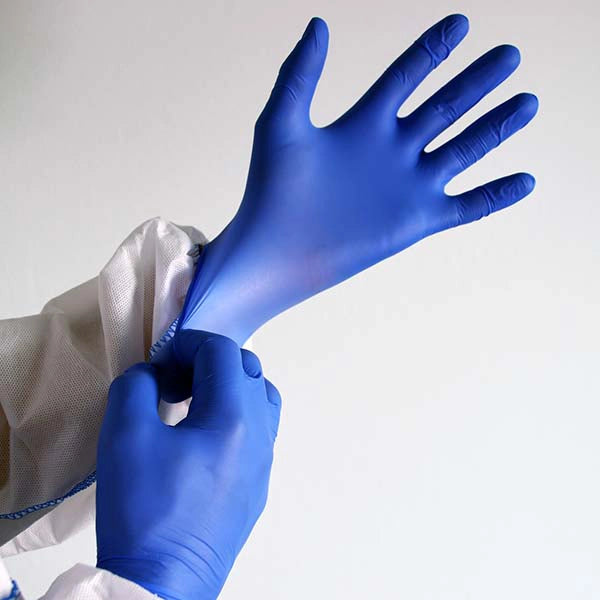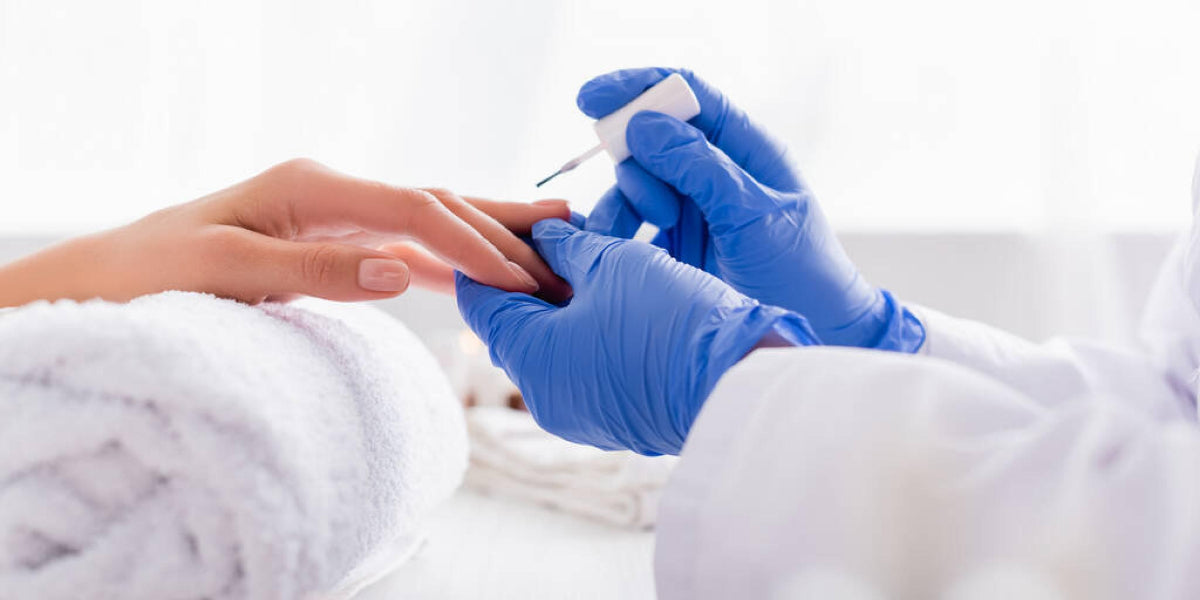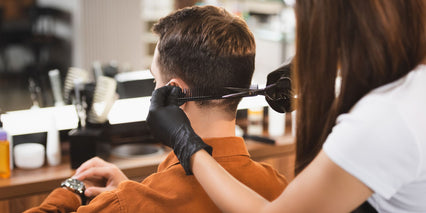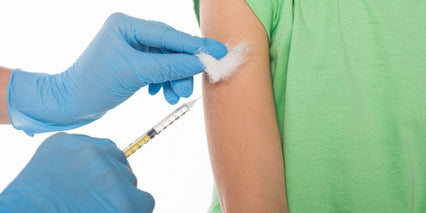What are the best nail salon gloves that are safe to use? Should nail techs wear gloves? What do professional nail techs use?
A nail salon has become a popular place for women to get their nails done. However, while getting manicures at a nail salon may seem like a relaxing way to spend an afternoon, it's also very dangerous if you aren't careful.
Keep reading to find out what those are and how cosmetologists can protect themselves.
What Gloves Do Nail Techs Use?
The most popular type of gloves used among nail techs are disposable nitrile gloves. They have the fit and feel of latex gloves, but they are 100% latex-free. They are non-allergenic and will not cause an allergic reaction. Many nail art professionals prefer to use black nitrile gloves to hide stains while servicing and maintain a professional look.
Nail technicians must have access to all areas where they work on clients' fingernails. This includes applying color, removing old polish, filing down rough edges, cutting off excess material, and trimming nails. The most common type of glove used by nail technicians are the disposable black nitrile gloves. These gloves are made out of a synthetic natural rubber and offer excellent grip, dexterity, and tactile sensitivity. Furthermore, they are great because they allow nail professionals to safely perform numerous types of nail care treatments.
Should Nail Techs Wear Gloves?
It is advisable for nail techs to protect themselves from the harmful ingredients found in polish removers, glues, and other chemicals by wearing gloves. Nail salon workers who don’t wear gloves could be exposed to biohazards through contact with clients' cuticles or fingers.
Certain harsher chemicals are not desirable for nail salon workers to come into contact with. Chemical compounds in nail polishes and lacquers are potent enough to cause sickness.
Best Gloves For Nail Techs
The A.S.A.P. powder-free black nitrile gloves are the most nail salon-friendly. Unlike natural rubber latex gloves, there is no risk of an allergic response using them. They have a comparable fit and feel to latex gloves, and are completely free of latex.
By including the flexible and dexterous properties of latex-free materials, these products can meet the needs of cosmetologists, pedicurists, manicurists, and nail art specialists. When it comes to buying nitrile gloves, it is recommended to get these because they are the safest and most effective.
What Chemicals are Commonly Found in Salon Products?
Here are the top hazardous chemicals found in common nail salon products.
Nail Polish Remover Chemicals
- Acetone
- Acetonitrile
- Butyl acetate
- Ethyl acetate
- Formaldehyde
- Isopropyl acetate
Nail Polish Chemicals
- Acetonitrile
- Butyl acetate
- Dibutyl phthalate (DBP)
- Ethyl acetate
- Isopropyl acetate
- Toluene
Fingernail Glue Chemicals
- Ethyl acetate
- Toluene
Artificial Nail Liquid Chemicals
- Ethyl methacrylate (EMA)
Nail Hardener Chemicals
- Formaldehyde
Nail Primer Chemicals
- Methacrylic acid
Artificial Nail Product Chemicals
- Methyl methacrylate (MMA) - banned for use in many states
Disinfectants
- Quaternary ammonium compounds
How Do Salons Handle Chemicals?
Reduce exposure to toxic chemicals in salon products by keeping your hands covered while handling them. Always wash your hands before and after working with a client. Put on a fresh pair of disposable gloves before handling products. Discard gloves immediately if a cut, tear, or hole is found. Wash your hands in case any toxins touch your skin and put on a new pair of gloves before continuing work.
If you notice your skin becoming irritated, the type of gloves you are using may not be effective. The toxic chemicals may be permeating through the gloves, especially if they are not chemical-resistant.
Scratches, scrapes, cracks, or cuts on the skin are prone to higher chemical absorption after exposure. Keep all dry and damaged skin covered with protective gloves.
Here are more tips for keeping your nail station work area safe.
1. Clean and disinfect the work area between customers.
2. Take care of any spills immediately.
3. Wash and disinfect all equipment after use.
4. Safely dispose of any waste wearing appropriate hand protection.
What are the Biological Hazards in Nail Salons?
There are many biological hazards nail salon workers can encounter. The worst offenders are viruses, bacteria, and fungi. Examples include hepatitis B, hepatitis C, and human immunodeficiency virus (HIV).
How Can Salons Prevent Biological Hazards?
1. Wash hands frequently with soap and water, including before and after each client.
2. Keep hands dry to prevent skin irritation.
3. Clean and disinfect all surfaces, tools, foot basins, and spas frequently.
4. Avoid direct contact with bodily fluids or blood by always wearing gloves.
5. Never service clients with open wounds or infections.
Immediately throw away disposable gloves after use
Be sure to wear the appropriate type of gloves while disinfecting tools and equipment. Not all gloves resist strong chemicals.
What are Disposable Manicure Gloves?
Disposable manicure gloves protect your hands from germs and bacteria in the environment of the nail salon. They also provide adequate protection from hazardous chemicals found in polish remover, acrylic powders, and gel nail formulas during nail specialty services.
Manicures, pedicures, and artificial nails will put you in intimate touch with customers and harsh chemicals. It is recommended by OSHA (Occupational Safety and Health Administration) in the United States Department of Labor to wear disposable nitrile gloves during nail services. Except acetone, which is better protected by latex or vinyl gloves, they protect against numerous chemicals typically found in nail products.
It is crucial to note that disposable nitrile nail manicure gloves are efficient at guarding against bloodborne diseases and infections that you may come into contact with when working in direct contact with customers.
Do Nitrile Gloves Ruin Nails?
Nitrile gloves will not ruin your nails or manicure while servicing a client. Single-use gloves are made for short-term use before discarding. Always throw disposable gloves away and use a new pair between services and customers. Refrain from touching surfaces while wearing gloves to prevent cross contamination. Disinfect all areas before putting on clean gloves.
Wearing them for extended periods of time will result in a damp, warm, and humid atmosphere. Unfortunately, this might result in the formation of natural skin yeast, which is a recipe for nail problems. Change gloves frequently, wash your hands with soap, and dry them completely before putting on a new pair.
Benefits of Salon Nitrile Gloves
The benefits of using nitrile hand protection for salon care are numerous. The original intent of these nitrile nail salon gloves as medical gloves proves to be the biggest benefit of all! As expected, they have also become highly useful in nail salons, spas, and nail art studios. Because of their reasonable cost, comfortable feel, and high protection level, they allow you to focus more on your clients and creative expertise.
The 4 mils average thickness aids in high tear, puncture, biological, and chemical resistance. They are powder-free, non-allergenic, tested by the American Society for Testing and Materials, and have a 510-K certified exam grade protection level medical grade glove status.
Where to Buy Nitrile Gloves for Nail Technicians
Nail techs who want to purchase nitrile gloves should look into purchasing them online from us! We have many styles and sizes that are perfect for any professional needing quality hand protection during work hours.
You can find nitrile gloves here at competitive prices and the delivery is fast. In addition to gloves for nail technicians we also sell hair dye gloves for hairdressers and barbers.
Gloves For Nail Techs: Frequently Asked Questions
Why do nail techs wear black gloves?
Nail techs wear black gloves primarily for aesthetic and practical reasons. Black gloves do not show stains from nail polish, gels, or other chemicals used during nail services, maintaining a clean and professional appearance. Additionally, they help create a stylish and sophisticated look that aligns with many salon environments.
Are manicurists supposed to wear gloves?
Manicurists are generally supposed to wear gloves to protect themselves and their clients. Gloves help prevent the spread of infections and shield the skin from harsh chemicals and nail products. Wearing gloves is especially important when dealing with clients who have cuts, infections, or any other condition that could potentially spread.
What PPE should a nail tech wear?
A nail tech should wear several types of personal protective equipment (PPE) to ensure safety and hygiene. This includes gloves to protect the hands from chemicals and infections, masks to prevent inhaling dust and fumes, and eye protection if there is a risk of splashes from chemicals. An apron or protective clothing can also be worn to protect the body from spills and splashes.
Should I wear gloves when doing gel nails?
Wearing gloves when doing gel nails is highly recommended. Gloves protect your skin from the chemicals in the gel products and from potential allergic reactions. They also help maintain a hygienic environment, reducing the risk of transferring oils and bacteria from your hands to the client’s nails, which can affect the quality of the gel application.







